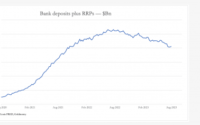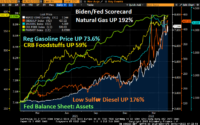U.S. Corporate-Credit Risk at Highest Since November 2020 as Stocks Plunge
(Bloomberg) — They’re far from panicking, but it appears credit investors are getting more cautious.
Most Read from Bloomberg
A key measure of U.S. corporate credit risk reached the highest since November 2020 as U.S. stocks tumbled after disappointing results from Meta Platforms Inc. and a markedly hawkish tone from the European Central Bank.
The Markit CDX North American Investment Grade Index widened a little over three basis points Thursday to about 63.5 in New York trading, the highest in nearly 15 months. It’s a similar story for a credit-risk gauge in high-yield bonds.
Poorly received earnings reports from a slew of U.S. tech companies are unnerving investors across the risk spectrum. The risk-off tone Thursday was enough for at least two potential U.S. high-grade borrowers to stand down and postpone borrowing plans, according to people familiar with the matter.
Only one high-grade borrower came forward Thursday, a day after primary market demand was exceptionally strong.
While corporate credit generally has held up well in the face of broader volatility, the rising credit risk gauges indicate greater investor interest in hedging. Credit derivate volume has been elevated for more than a week, with more than $20 billion of trading in CDX IG per day, according to data compiled by Bloomberg.
Credit investors all over the world are starting to price in looming interest-rate hikes amid questions about the debt-servicing capacity of highly leveraged corporates. European Central Bank President Christine Lagarde was notably hawkish in a news conference Thursday as price pressures remain elevated, and Brazil’s central bank delivered its third straight rate hike of 150 basis points yesterday.
Elsewhere in credit markets:
Americas
McAfee Corp. for the second time this week shifted some of the financing for its more than $14 billion leveraged buyout into loans from junk bonds, the latest signs of demand for floating-rate over traditional fixed-rate debt.
-
Prince International is in line to price a $756 million unsecured bond Thursday after increasing the yield on the note to a range of 8.75% to 9%, after initially floating a yield of low 8%
-
Sales of green bonds exceeded $53 billion globally in January, up more than 50% compared with the corresponding period of last year, data compiled by Bloomberg show
-
Ken Griffin’s Citadel Securities won an investment-grade rating from Moody’s Investors Service, which cited the trading powerhouse’s steady risk management and performance during turbulent markets
-
GBG USA Inc., a subsidiary of Global Brands Group Holding Ltd., won court approval of a bankruptcy plan that leaves some creditors with almost no recovery
-
For deal updates, click here for the New Issue Monitor
-
For more, click here for the Credit Daybook Americas
EMEA
Germany’s state of Berlin is the sole issuer offering bonds in Europe’s primary market on Thursday, as bankers and investors await more clues on how quickly key central banks will tighten monetary policy.
-
Policy decisions from the European Central Bank and the Bank of England are due today, as they seek to manage surging inflation. The BoE is likely to deliver its first back-to-back rate rise since 2004
-
Investment-grade borrowers will be attracted to private debt from public bond market as the ECB phases out its pandemic emergency purchase program (PEPP) by March, according to a report by Scope Ratings
-
“The gradual reduction of net asset purchases under the corporate sector purchase programme (CSPP) over the next few quarters will likely lure some bigger investment-grade rated companies back to Schuldschein,” wrote Sebastian Zank, deputy head of corporate ratings at Scope
-
Asia
Pakistan’s plan to raise $1 billion via ESG eurobonds was the main news on an otherwise quiet day for the primary dollar-debt market in Asia.
-
Last month, Asia dollar bonds suffered the biggest losses since March 2020, according to a Bloomberg index
-
Singapore has reopened after the Lunar New Year holiday, although Hong Kong and China are still closed
Most Read from Bloomberg Businessweek
©2022 Bloomberg L.P.
[ad_2]
Source link


